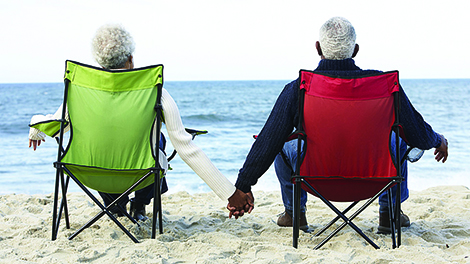Love is in the air for all—even seniors! In fact, the passion amongst those in their golden years is at an all-time high. So much so that STIs (sexually transmitted infections) have become increasingly common among the senior age group, and treatments have increased by 23 percent within the last three years.
With a lot of love left to give and a little help from technology, today’s seniors actively play the love game. Choice Mutual, an independent insurance agency that researches a variety of consumer and societal issues, surveyed 2,000 seniors (ages 55-plus) about relationships to learn what love is like for the people who have been around the block a few more times than younger generations. They were asked about their current relationship status, how they met their partners, if they’ve dated within the last five years, what dating apps they’ve used, if they’ve cheated or been cheated on, and what’s important to them in a relationship.
More than one-third of seniors have dated within the last five years and tried various methods for meeting new people. Dating seniors say they’ve had the best luck in meeting their significant others through an introduction by mutual friends (18 percent), dating apps or websites (13 percent), and local events (12 percent) such as parties and community activities. About 66 percent of those using dating apps or websites had a relationship with someone they met that way. Seniors reported that the top dating app was Tinder, with 35 percent dating someone they met on the platform. Other sites where seniors have had luck finding relationships were Match.com (28 percent), Hinge (25 percent), Plenty of Fish (25 percent), and Bumble (24 percent).
Every individual is looking for different things in a relationship, but it’s clear that seniors especially value trust in a relationship. Choice Mutual asked survey respondents to rank nine common relationship factors based on importance–trust, communication, honesty, empathy, emotional intimacy, physical intimacy, sexual attraction, loyalty, and common interests. Out of those nine factors, trust had the highest average ranking, with 47 percent of respondents saying it is the =most important factor in a relationship. On the other end, common interests ranked as the least important.
Some seniors aren’t so lucky when it comes to love. One in 10 has never been in a romantic relationship lasting longer than one year. The struggle for single seniors doesn’t end there—54 percent haven’t dated within the last five years.
Dating is especially difficult after experiencing extreme heartbreak, and many find that dating is simply too difficult after losing a spouse. Only 14 percent of widowed responders have dated seriously within the last five years, and 62 percent haven’t dated at all.
From the age of 30 until now, over half of seniors have experienced cheating in some form, whether they did the cheating, were cheated on, or a combination of both (not necessarily in the same relationship). Cheating can play a major role in a relationship at any age. Forty-two percent of separated and divorced respondents reported that they’ve had a partner cheat on them at least once.
Overall, it seems that those who have never cheated have a slightly higher chance of being married. Respondents who haven’t cheated are 13 percent more likely to be married than those who have cheated on a partner.
Seniors who are married and have been with a romantic partner for more than 50 years met most frequently while at school (33 percent).
Anthony Martin, who wrote this article, is the founder chief executive officer of Choice Mutual, an independent insurance agency licensed in all 50 states.

THE MID-LIFE MARRIAGE SLUMP
As people age into midlife and beyond, romantic relationships might go into a slump that can mean living unfulfilled lives or an end to decades-long marriages. Susan Bratton, 60-year-old author of books about intimacy and relationship health and who has shared her views on national television (susanbratton.com), has some tips for overcoming those kinds of bumps in the marital road.
- Practice being a soulmate. Hold each other close and tell the how precious they are, and why.
- Move past arguments. “We’ve all heard the adage, ‘Don’t go to bed angry,’ but this is more easily said than done,†Bratton says. So do the following: Let it go. Forgive and forget. Think about how to understand the other person’s side. And breathe. Breathing calms you down and gets you over that momentary emotional flare.